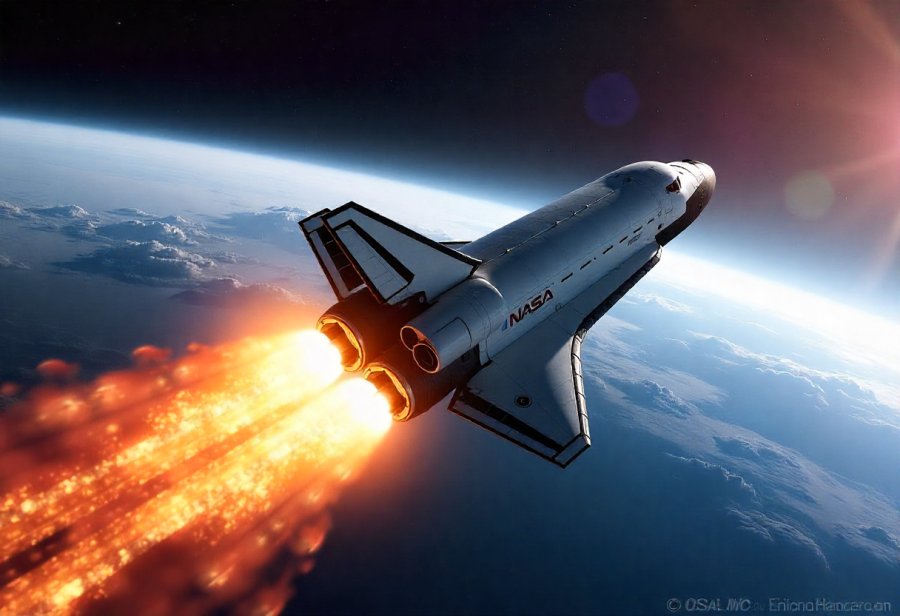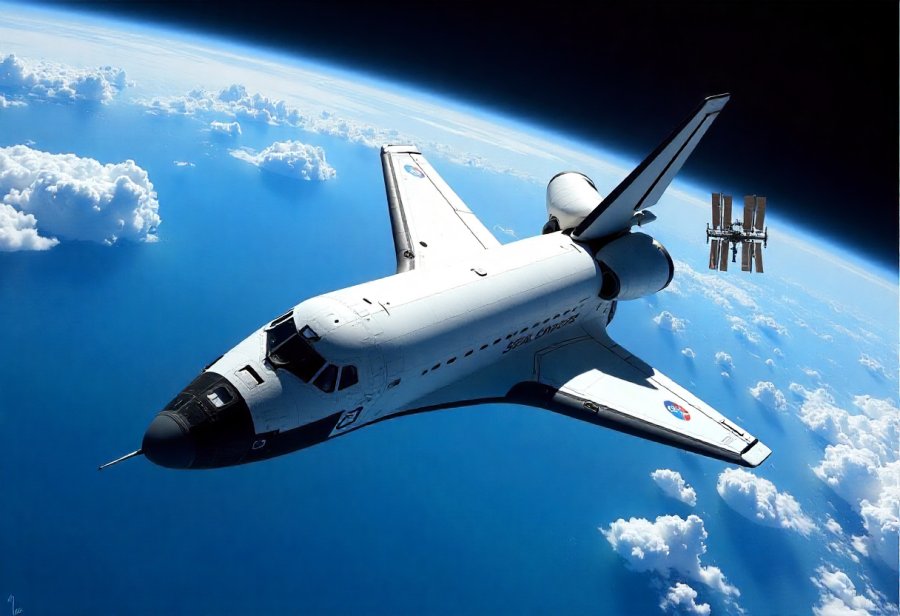
The final flight of NASA’s Space Shuttle Atlantis in 2011 marked a historic turning point in human space exploration. As it lifted off from Kennedy Space Center, millions around the world watched with pride, witnessing a culmination of nearly three decades of technological innovation and international collaboration. This mission not only delivered vital supplies and advanced scientific equipment to the International Space Station but also showcased the remarkable capabilities of reusable spacecraft, setting new standards for safety and efficiency. Yet, it symbolized more than technological achievement—it represented the end of an era and the dawn of new opportunities, with private companies emerging to carry the torch forward. What lessons does Atlantis’s legacy hold for future exploration beyond low Earth orbit? This milestone continues to inspire innovation, resilience, and collective human curiosity, reminding us that the quest to explore the cosmos is an ongoing journey driven by ingenuity and shared ambition.

Celebrating the Final Flight of Atlantis: An Enduring Legacy of Innovation
In 2011, the space community reached a poignant milestone with the final flight of NASA’s Space Shuttle Atlantis. After nearly 30 years of pioneering human spaceflight, this mission marked the end of an era characterized by innovation, resilience, and international teamwork. Watching Atlantis lift off from Kennedy Space Center, millions around the world shared a sense of pride and nostalgia, aware that this journey would carry vital supplies and equipment to the International Space Station, ensuring the continuity of scientific research and human presence in orbit.
This last mission was more than a routine spaceflight; it was a culmination of decades of technological achievement. Atlantis had played a central role in constructing and maintaining the ISS, helping to expand humanity’s reach beyond Earth. Its departure signaled a shift in NASA’s strategy, moving away from reliance on the shuttle’s unique capabilities and toward new, innovative methods for exploring space. The mission underscored how reusable spacecraft had transformed access to orbit—making missions more sustainable, cost-effective, and adaptable.
The significance of Atlantis’s final journey extends beyond its immediate objectives. It embodied the evolution of space technology, showcasing advances like improved docking systems, thermal protection, and cargo transfer methods. These innovations, built upon years of engineering refinement, continue to influence spacecraft design today. The mission also highlighted the importance of international collaboration, as Atlantis helped sustain the global effort behind the ISS, exemplifying how nations can unite around shared scientific and exploratory goals.
In addition to technological milestones, the launch served as a powerful symbol of human perseverance and ingenuity. It inspired a sense of collective achievement, reminding us that space exploration is a shared journey that pushes the boundaries of what’s possible. As Atlantis soared into the sky, it carried not just cargo but the hopes of a generation eager to unlock the universe’s secrets.
The Atlantis mission marked the closing chapter of the shuttle program, but it also opened new opportunities. Its legacy laid the foundation for emerging commercial ventures, setting standards for safety, reliability, and versatility. The transition to private companies like SpaceX and Boeing aims to make space more accessible, building on the innovations and lessons from Atlantis’s storied career.
Ultimately, the final flight of Atlantis was a testament to human curiosity, resilience, and our relentless drive to explore. It celebrated the achievements of the past while paving the way for future missions deeper into space. This historic launch continues to inspire explorers and engineers alike, reminding us that the quest to understand our universe is an ongoing adventure—one that begins with bold steps and never truly ends.
Atlantis’s Last Mission: A Historic Milestone in Space Exploration
The final flight of Atlantis in 2011 marked a pivotal moment in the history of human space exploration. After nearly three decades of service, this mission symbolized both the culmination of technological progress and the end of an era. Throughout its career, Atlantis was instrumental in building and maintaining the International Space Station, helping to expand humanity’s presence beyond Earth’s surface. Its departure reflected a broader shift in NASA’s approach, moving from reliance on the shuttle’s unique capabilities toward newer, more versatile methods for reaching space.
Over the years, Atlantis delivered crucial modules, repaired the Hubble Space Telescope, and supported scientific experiments vital for advancing our understanding of the universe. These achievements demonstrated the shuttle’s adaptability and reliability, setting new standards for reusable spacecraft. The mission’s success was rooted in innovations like improved docking systems and thermal protection, which continue to influence spacecraft design today. Each milestone built on the last, pushing the boundaries of what was possible in spaceflight.
Atlantis’s final journey also underscored the importance of international collaboration. As part of the effort to sustain the International Space Station, its missions brought together multiple nations, showcasing how shared goals can unite diverse partners. The shuttle’s role in delivering supplies and scientific equipment helped cement the station’s status as a hub for scientific discovery and international cooperation. Atlantis’s contributions reinforced the idea that space exploration is most impactful when pursued collectively.
This mission marked a turning point for NASA, signaling the end of the shuttle era and the beginning of a new chapter involving commercial partners like SpaceX and Boeing. These companies are now taking on vital roles in cargo and crew transport, building on the technological foundations laid by Atlantis. The transition aims to make space more accessible and cost-effective, ensuring that the progress achieved during the shuttle program continues to propel exploration forward.
Technological advancements from Atlantis’s career laid the groundwork for future exploration beyond low Earth orbit. Improved docking procedures, thermal protection, and cargo transfer techniques serve as benchmarks for the next generation of spacecraft. These innovations are not just relics of the past but active components shaping the design of vehicles destined for lunar, Martian, and deep-space missions.
The legacy of Atlantis’s final mission is also cultural. It inspired a sense of pride and curiosity worldwide, reminding us of what human ingenuity can accomplish. Its success encouraged new generations of scientists, engineers, and explorers to push further and aim higher. The shuttle’s story continues to motivate efforts to unlock the secrets of the cosmos, inspiring hope and ambition for the future.
In essence, Atlantis’s final flight was more than a technical achievement; it was a milestone that encapsulated decades of progress and international teamwork. It highlighted the power of innovation and resilience in overcoming challenges and expanding our horizons. As space exploration evolves, the legacy of Atlantis endures, guiding the next steps in humanity’s ongoing journey into the universe.

Global Reactions and the Cultural Impact of Atlantis’s Departure
The final shuttle flight of Atlantis in 2011 sparked widespread reactions that resonated well beyond the space community. Millions around the globe watched the launch live, sharing a collective sense of pride, nostalgia, and awe. Media outlets celebrated the mission’s milestones, framing it as a historic moment that marked both an end and a new chapter for space exploration. The image of Atlantis soaring into the sky became a powerful symbol of human ingenuity and perseverance, inspiring stories that would be retold for years to come.
International responses underscored Atlantis’s role in fostering global cooperation. Countries involved in the International Space Station recognized the shuttle’s critical contributions, emphasizing that space exploration remains a collective effort. Its missions helped cement partnerships and demonstrated what nations can achieve when working together towards common scientific and exploratory goals. This spirit of collaboration highlighted that space endeavors are most impactful when driven by shared vision and joint effort.
Beyond immediate reactions, Atlantis’s legacy has deeply influenced culture and education. The mission sparked countless stories, artworks, and discussions about humanity’s future in space. For many young people, Atlantis became a symbol of possibility, fueling curiosity and inspiring careers in science, technology, engineering, and mathematics. Its departure was not just a farewell to a program but a catalyst for renewed motivation and innovation across generations.
Technologically, Atlantis’s final journey showcased advancements that remain relevant today. Its precise docking systems, thermal protection, and cargo transfer methods set new standards for safety and efficiency. These innovations did not end with the shuttle’s retirement; instead, they laid a foundation for future spacecraft and exploration efforts. The mission’s technological achievements continue to influence design and operational practices in spaceflight.
Within NASA and the broader space sector, Atlantis earned profound respect for its reliability and versatility. Its involvement in deploying satellites, repairing the Hubble Space Telescope, and supporting station assembly demonstrated how adaptable and resilient space vehicles need to be. These accomplishments reinforced confidence in reusable spacecraft and underscored the importance of operational resilience for ongoing and future missions.
Atlantis’s final flight became a lasting symbol of human resilience and progress. It reminded us that exploration is a shared journey, driven by curiosity, teamwork, and perseverance. Its legacy continues to inspire new missions and ambitions, encouraging us to reach further and dream bigger. As we look to the future, the story of Atlantis’s final mission remains a testament to what humanity can achieve when we dare to explore beyond our limits.
This enduring legacy also highlights the importance of continuous innovation in space technology. For those interested in the ongoing advancements inspired by Atlantis’s mission, exploring the space exploration initiatives provides valuable insights into the future of human endeavors beyond Earth.
Long-Term Effects of Atlantis’s Final Journey on Space Technology and Collaboration
The last flight of Atlantis in 2011 set a new standard for the capabilities of reusable spacecraft, with effects that continue to shape space exploration today. Its successful missions demonstrated that complex, high-stakes operations could be performed reliably, paving the way for more ambitious projects. The technological advancements made during Atlantis’s career—such as improved docking systems, thermal protection, and cargo transfer techniques—have become benchmarks for future spacecraft design, influencing vehicles destined for lunar, Martian, and deep-space missions.
Beyond the technological legacy, Atlantis’s final mission reinforced the importance of international collaboration. By delivering supplies, scientific instruments, and modules to the International Space Station, the shuttle helped maintain a global effort to learn from and live in space. Its contributions underscored how shared goals and partnerships can amplify the reach and impact of space exploration, inspiring continued international cooperation in future endeavors.
Atlantis’s role in supporting the ISS’s operations and scientific research also highlighted the significance of dependable logistics in sustaining long-term human presence in orbit. The shuttle’s ability to carry large payloads and support complex assembly tasks proved that reusable spacecraft could be both efficient and resilient. These lessons laid the groundwork for a new approach to space logistics—one that emphasizes sustainability, adaptability, and operational resilience, crucial for future deep-space exploration.
The mission’s influence extends into the evolving commercial space sector. Atlantis’s success helped shift the narrative toward involving private companies like SpaceX and Boeing, which now play vital roles in cargo and crew transportation. Building on the shuttle’s legacy, these companies are developing innovative, cost-effective solutions that promise to make space more accessible and affordable. This transition aims to ensure that the progress achieved during Atlantis’s era continues to drive exploration and innovation.
Technological progress from Atlantis’s career also fostered safety improvements across the industry. Enhanced docking procedures, thermal protection, and cargo handling techniques have increased confidence in spacecraft safety during launch, orbit, and re-entry. These advancements reduce risks for astronauts and cargo alike, supporting more ambitious missions beyond low Earth orbit. The innovations pioneered by Atlantis continue to serve as foundational elements for the next generation of exploration vehicles, ensuring that resilience and safety remain priorities as humanity pushes further into the cosmos.

Reflecting on Atlantis’s Last Flight: A Legacy of Progress and Human Ingenuity
The last flight of Atlantis in 2011 marked a milestone that goes beyond the end of a program; it embodies decades of innovation, resilience, and human curiosity. This mission proved that reusable spacecraft could perform complex, high-stakes tasks reliably, setting a standard that still influences spacecraft design today. Its success in delivering critical supplies and scientific equipment to the International Space Station kept humanity’s presence in orbit alive and thriving, reinforcing the shuttle’s vital role in scientific progress.
This final journey also signaled a shift in NASA’s approach to exploration. As Atlantis departed, the agency moved toward partnerships with private companies like SpaceX and Boeing, aiming to foster innovation and reduce costs. These collaborations build on the technological foundations laid by the shuttle, ensuring that the spirit of exploration continues to evolve and expand beyond low Earth orbit.
The technological advancements made during Atlantis’s storied career—such as improved docking procedures and thermal protection systems—remain benchmarks for future spacecraft. These innovations have not only improved safety and efficiency but also paved the way for missions to the Moon, Mars, and beyond. The legacy of Atlantis’s engineering continues to influence the design and operation of the next generation of explorers.
Beyond technology, Atlantis’s final flight inspired a renewed sense of wonder and collective pride worldwide. It reminded us that exploration is a shared human journey, driven by curiosity and teamwork. For many, the shuttle became a symbol of what humanity can achieve when we dare to push our limits. Its legacy fuels the ambitions of new generations eager to unlock the universe’s mysteries.
The shuttle’s versatility and resilience during its operational life built confidence in reusable spacecraft as essential tools for long-term exploration. Whether deploying satellites, repairing telescopes, or supporting station assembly, Atlantis demonstrated that adaptability is crucial for tackling the challenges of future missions—whether in deep space or on distant planets.
As we look ahead, the enduring impact of Atlantis’s final mission lies in its role as a catalyst for progress. It showed that technological innovation and international cooperation are key to expanding our horizons. The lessons learned continue to shape how we approach exploration, inspiring new ideas and bold ambitions.
Atlantis’s legacy is a testament to what humans can achieve through perseverance, ingenuity, and collaboration. Its final flight celebrated the triumphs of the past while lighting the way for future discovery. The spirit of exploration it embodies will continue to propel us forward, inspiring us to reach further and dream bigger than ever before.




